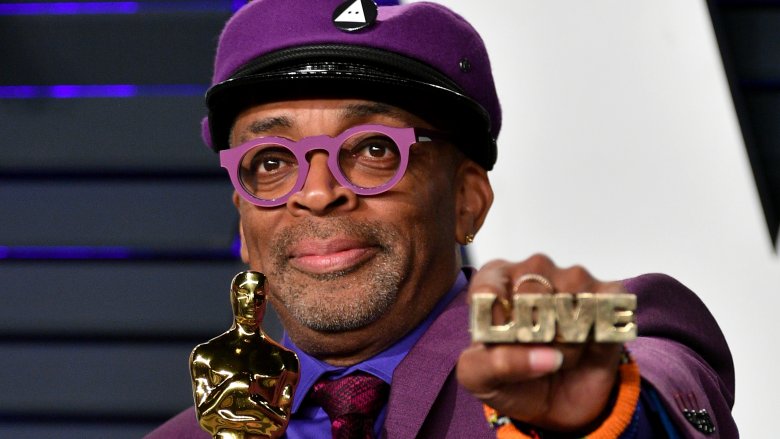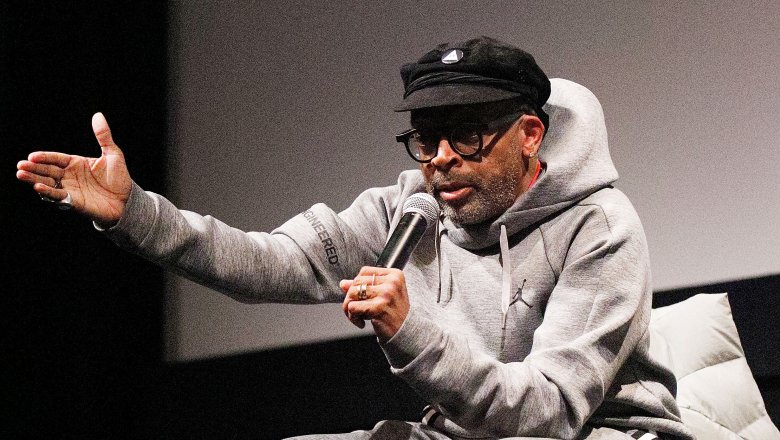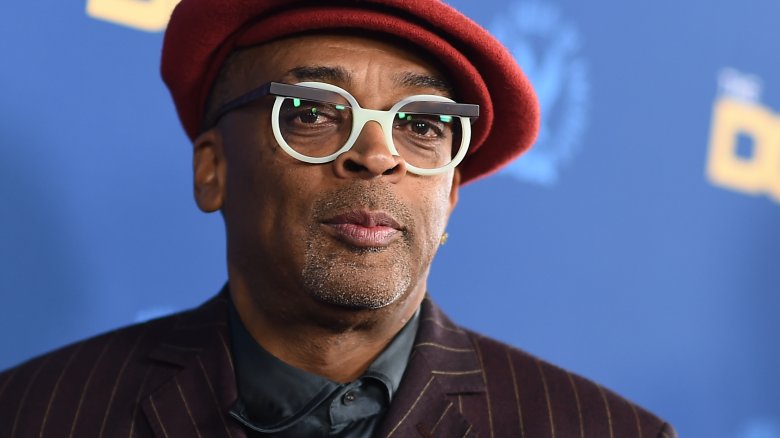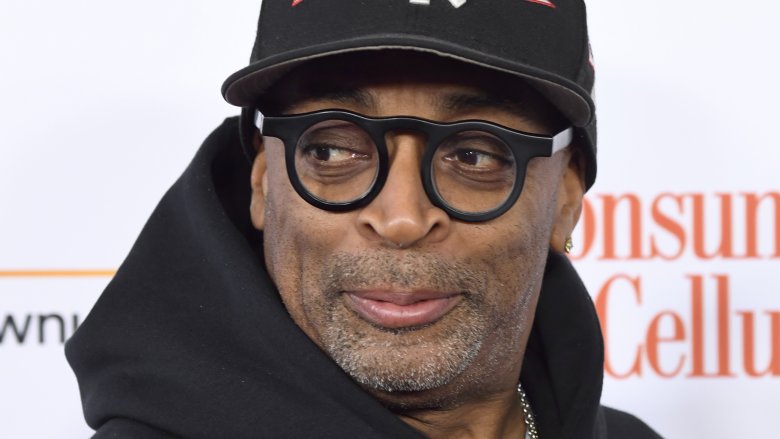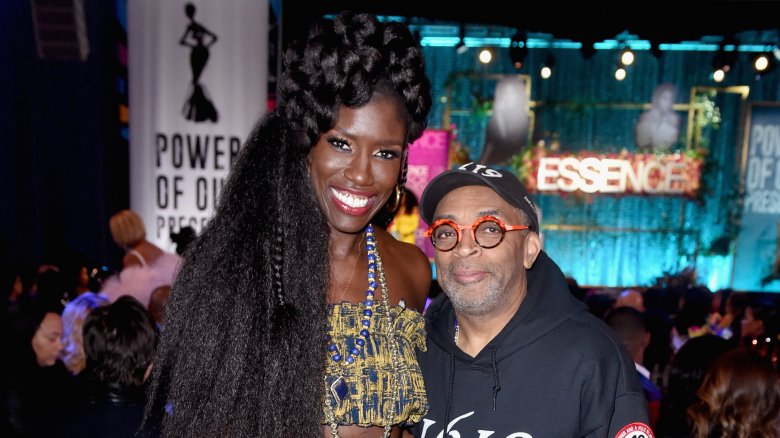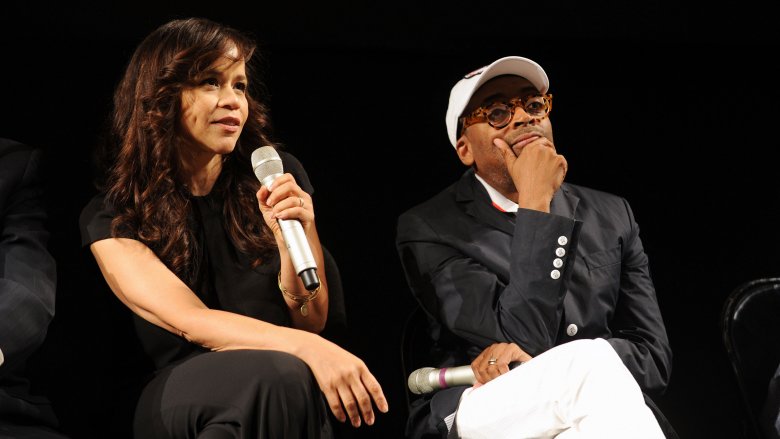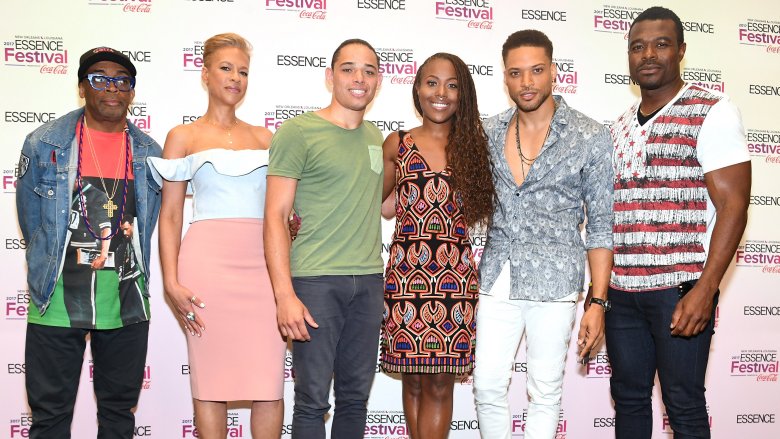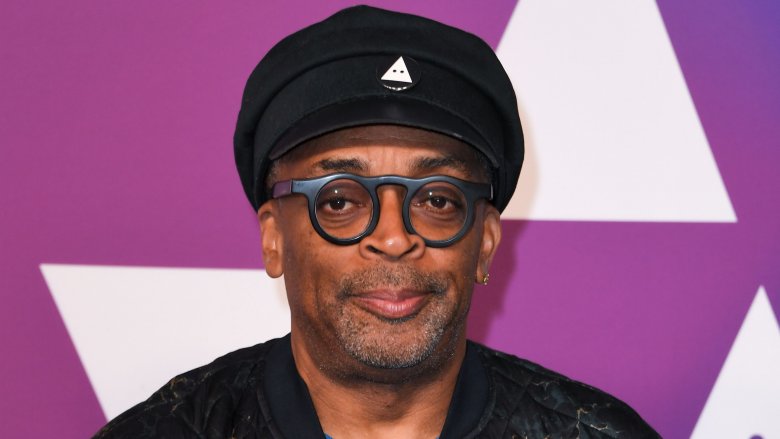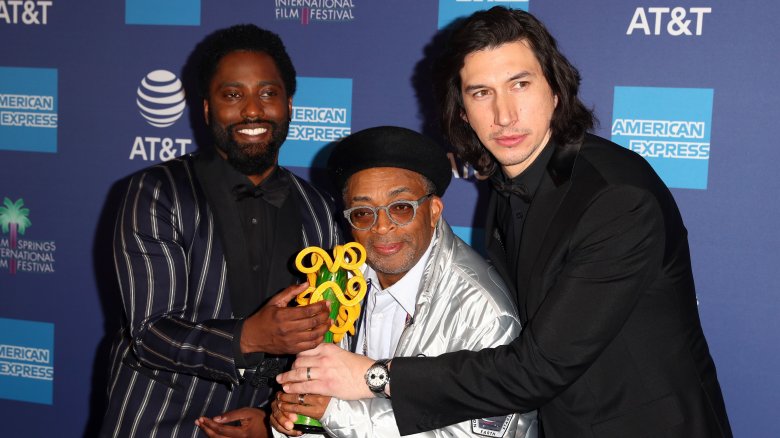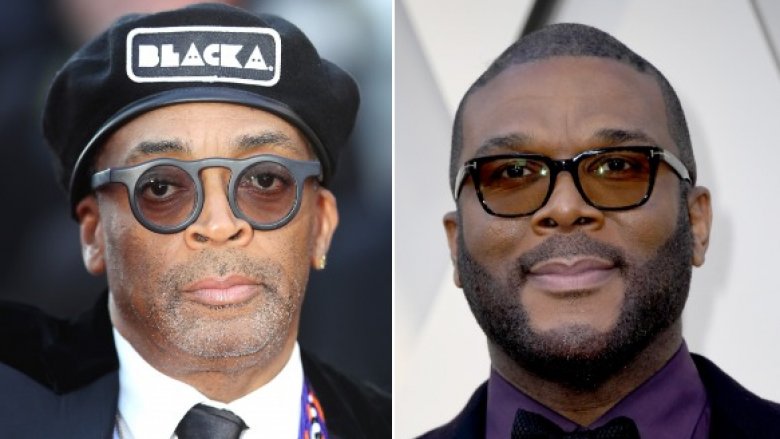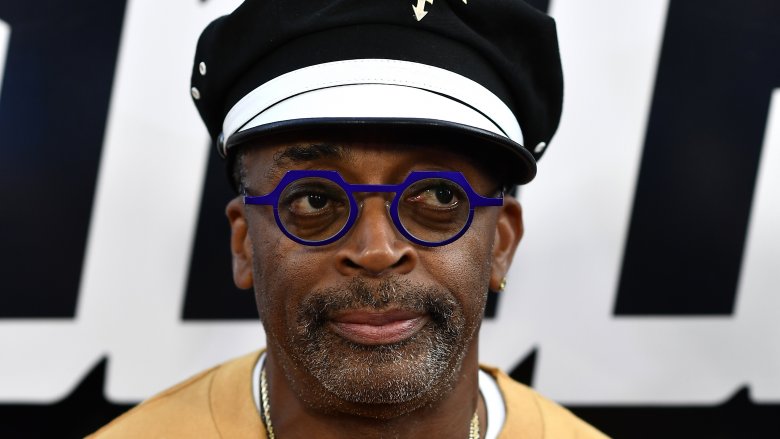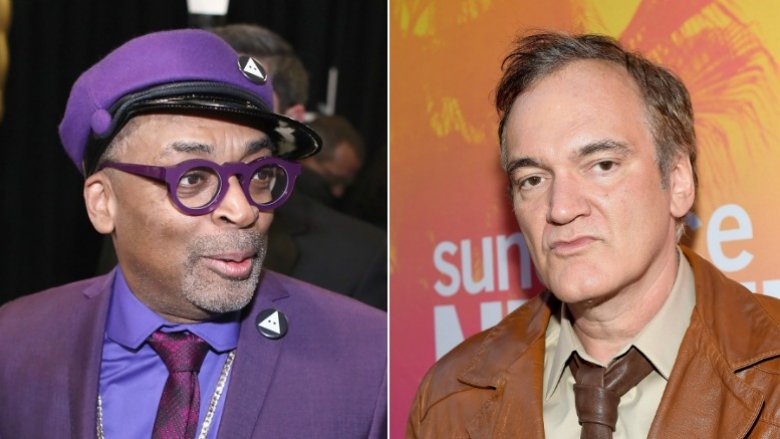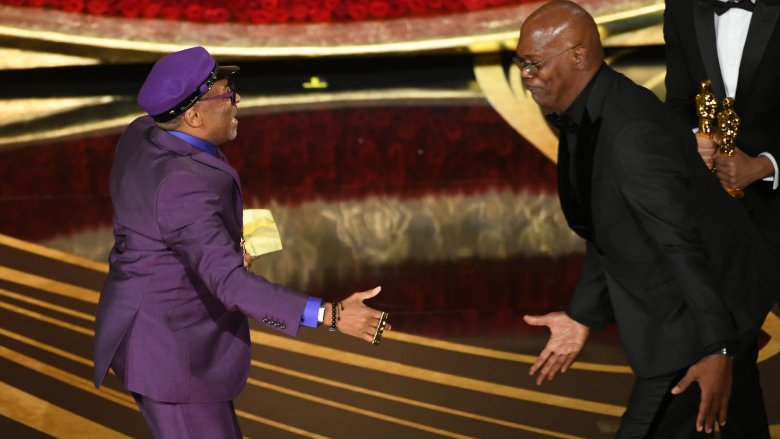The Untold Truth Of Spike Lee
A good filmmaker shows people what they want to see. A great filmmaker also shows people what they need to see. Shelton "Spike" Lee has always strived for greatness. Insightful and incendiary, Lee uses his artistic gifts to confront moviegoers with unflinching examinations of racism and historically taboo topics like female sexuality and interracial relationships. Though at times he's arguably missed the mark, he undeniably tries to do the right thing.
Lee has done his thing as a writer, director, and producer for decades. Along the way, he created classics like School Daze and Malcolm X and helped propel the acting careers of icons like Halle Berry and Samuel L. Jackson. He instigated debates about divisive issues and infuriated other big-name filmmakers with the kinds of barbed remarks you'd expect from a guy called Spike. And in 2019 he won an Oscar for the screenplay of BlacKkKlansman. Someone who writes and invites that much meaningful dialogue is worth talking about. Here's the untold truth of Spike Lee.
The man who made 'Jungle Fever' has a white stepmom
Spike Lee — or as his grandma called him, "Spikey-Poo" — is the oldest of six children. His father, Bill, is a jazz musician and his late mother, Jacquelyn, taught art and African-American literature to high schoolers. Lee's family has shaped his films on several levels. For instance, Mo' Better Blues follows the struggles of a black jazz musician. Lee's father composed scores for multiple films, and his sister, Joie, co-wrote Crooklyn, a semi-autobiographical account of Lee's Brooklyn upbringing. According to the New Yorker, Joie acted in many of his films and other siblings have done the videography and photography.
In 1977, Lee's mother passed away from cancer. Less than a year later his father tied the knot with a white woman. Their marriage upset Lee, who told CNN that kids "don't get along with a stepmother, especially in the amount of time that it happened." He claimed her race didn't bother him, but you might wonder if his film Jungle Fever, which paints a bleak portrait of interracial relationships, was somehow influenced by his father's interracial marriage. (Playboy asked about this, but Lee rejected the idea.) Per the New York Times, Jungle Fever aimed to deconstruct sexual stereotypes, including the depiction of white women "as beauty incarnate."
Lee's real-life summer of Sam
At first blush, a movie named after a notorious serial killer doesn't seem like it would reveal anything about Spike Lee's personal experiences, unless "Spike" also describes a weapon he secretly used to stab a bunch of people. But Summer of Sam, an allusion to "Son of Sam" David Berkowitz, wasn't Lee's cinematic murder confession. (His mom nicknamed him Spike because he was "a tough baby.") As he explained in a 1999 interview, the film captures an important and transformative chapter in New York City's history.
Set in a Bronx neighborhood in 1977, the movie explores how the Berkowitz murders impacted residents in a period defined by unfettered hedonism, before the AIDS crisis and shifting political attitudes redefined daily life. But Summer of Sam's themes of recklessness, looming upheaval, and coping with death might also be applied to Lee's life.
In 1977 Lee's mother died. Still an undergrad back then, he lacked direction and was academically unmotivated. Lee spent the summer of '77 in New York failing to find a job. Instead he found his future career. A massive blackout plunged the city into chaos. Rioters "set hundreds of fires and looted thousands of stores," according to Time. Using a friend's Super 8 camera, Lee recorded the mayhem. For him, filming New York's turmoil was "almost like an epiphany." He soon knew what to do with his life.
He almost got kicked out of NYU
In the early 1980s, Lee attended NYU's film school. There he met future director Ernest Dickerson, who also shot many of Lee's movies. However, that fruitful union might never have happened if NYU had gone through with its intention to expel Lee over a controversial project. That project was a film called The Answer, and it was Lee's answer to D.W. Griffith's Civil War-era epic, Birth of a Nation.
For context, Birth of a Nation was America's first bona fide blockbuster. In it Griffith painstakingly depicts major events like Abraham Lincoln's assassination and General Sherman's ferocious campaign to make Georgia's civilians "feel the hard hand of war." Unfortunately, he also portrays black men as lust-fueled savages and glorifies the Klu Klux Klan. The real-life KKK regained popularity and acquired new members as a result.
President Woodrow Wilson likened Birth of a Nation to "writing history with lightning," which is accurate in that it's highly charged and strikingly racist. Lee was struck by how instructors praised the movie's artistic merits while overlooking its detrimental real-world impact. So he highlighted the issue in The Answer, wherein a black filmmaker is tasked with remaking Griffith's work. As Lee recalled, "The faculty took it like I was attacking the father of cinema, so they kicked me out." Luckily, he had already landed an assistantship for the next year, so he got to stay.
The time he got kicked off of a historically black college campus
Legendary film critic Roger Ebert described Spike Lee's musical, "School Daze," as "the first movie in a long time where the black characters seem to be relating to one another, instead of to a hypothetical white audience." A comedic but meaningful look at undergraduate life at a historically black college, School Daze was praised for its originality and raw honesty. It addressed tensions that went unmentioned in most black films, namely hostilities between light-skinned and dark-skinned black people and how black people in general are judged by the naturalness of their hair. However, Lee's trademark boldness wasn't welcome at one black college.
Lee chose his own undergraduate stomping ground, Morehouse College, as one of the filming locations for School Daze. Though it was only his second feature film, he already had a reputation as an inflammatory filmmaker. According to the Morning Call, his movie debut was accused of lewdness, and Morehouse administrators worried Lee would cast "black colleges and black people as a whole" in an unfavorable light. The president demanded to see the script for School Daze, but Lee refused and shot scenes until he was kicked off campus.
Looking back on the incident in 2018, Lee made a disturbing revelation — the president of Morehouse thought the film's fictional college president looked "like a Sambo" (i.e. he was "too dark-skinned"). After hearing that, Lee concluded he was doing the right thing.
Rosie Perez was deeply disturbed by the ice cube scene in 'Do the Right Thing'
Anyone who's seen Do the Right Thing knows that the movie's message isn't as black and white as it sounds. In fact, Spike Lee made a point of not saying what "the right thing" is. An on-screen clash of cultures, the movie portrays mounting racial tensions between people of different ethnicities who share a neighborhood yet still seem worlds apart. On the hottest day of summer, intensifying resentment gives way to riotous violence and senseless death. With its in-your-face displays of racism and reference to a polarizing real-life rape case, Do the Right Thing makes for a visually and emotionally unsettling experience. However, the most uncomfortable part of the film occurred off-screen.
Do the Right Thing features a love scene between Spike Lee's character, Mookie, and Rosie Perez's character, Tina. Mookie rubs an ice cube along very sensitive and very unclothed parts of Tina's body. As recounted in Spike Lee's authorized autobiography, Perez (above) found the experience "very disturbing." "I found it much more exploitative than what I'd read," she explained. She expected "an intimate moment between boyfriend and girlfriend" but got "some guy" trying to get freaky. "Eventually, I burst into tears," Perez said. To make matters worse, she felt guilty for possibly disappointing Spike Lee, who was both her co-star and her director. Lee claimed he didn't know she was uncomfortable, but unscripted crying sounds like a dead giveaway.
Lee's greatest regret as a filmmaker
Being socially conscious in one area doesn't suddenly make you woke in all social matters. So while Spike Lee has been nuanced and thoughtfully provocative when it comes to race relations, many of his movies have had what the Root described as a "woman problem." Specifically, his female characters are sorely lacking in character traits. They're often one-note, and that note is often sour. This isn't just an outsider's interpretation. Lee himself admitted in a 2005 biography that many of his movies were informed by "unreconstructed male chauvinism."
The first and most jarring example of this pattern appeared in Lee's directorial debut, 1986's She's Gotta Have It. The movie's protagonist, Nola Darling, is a romantically emancipated woman who explores her carnal needs with three different suitors. But as if punishing her for her sexual indiscretions, Lee decided to have Darling raped by one of the men she's seeing. The disturbingness doesn't end there. As Bustle pointed out, Darling pursues a relationship with her rapist.
In 2014, Lee called the rape scene his "biggest regret" as a filmmaker and said if he could have "any do-overs, that would be it." He was was true to his word. In 2017 he released a Netflix remake of She's Gotta Have It. He replaced the rape scene with a frightening encounter with a catcaller and emphasizes the fact that "any level of violence towards women" can be traumatic.
The $10,000 tweet
When Florida resident George Zimmerman (who's white and Hispanic) fatally shot 17-year-old Trayvon Martin (who was black) in 2012, everything about the incident screamed "wrong." Zimmerman had ignored a police dispatcher's order not to follow Martin, whom Zimmerman didn't know but considered suspicious-looking. He ultimately shot the unarmed Martin during a physical altercation and said it was self-defense. Shoddy police work compromised the integrity of the investigation, and public opinion on whether Zimmerman committed a crime was largely divided along racial lines. For many black Americans it was an all-too-familiar scenario — a black person's life was needlessly extinguished under suspicious and racially charged circumstances.
In what was presumably a misguided attempt at vigilante justice, Spike Lee shared what he thought was George Zimmerman's home address with his 240,000-plus Twitter followers. In reality, Lee had given wrathful internet users the address of David and Elaine McClain. They had no connection to Trayvon Martin's killer, but Elaine said her youngest son's middle name was George, and his last name was Zimmerman. Lee apologized to the McClains and paid them $10,000. But that didn't stop the avalanche of vitriol and threats the couple faced, so they sued for another $15,000. A judge, however, dismissed the suit.
The allegations of anti-Semitism
Prejudice is a complicated beast. When someone says or does something that's deemed racially insensitive, it can be hard to distinguish the impression from the intention. And for many people, that distinction is immaterial. That's why a Virginia attorney general darkening his face (albeit in his youth) to look like a black rapper he admired still comes off as a modern-day minstrel show. It's also why Spike Lee got accused of anti-Semitism.
Lee raised people's eyebrows and blood pressure with 1990's Mo Better Blues. Partly inspired by his father's real-life ordeals, the movie revolves around a black jazz musician who is heartlessly exploited by Jewish jazz club owners. The issue wasn't just that they were Jewish. As the New York Times described, the film's villains were "loaded with despicable traits typically used to disparage Jews." The characters were wealthy, stingy, litigious, and in charge of entertainers.
Lee denied implying that those were stereotypically "Jewish" characteristics but then he undercut his defense by arguing that Jews control Hollywood. In a more thoughtful New York Times op-ed, he addressed his detractors. "All Jewish club owners are not like this, that's true, but these two are," he wrote. He also pointed out a double-standard: "Not every black person is a pimp, murderer, prostitute, convict, rapist or drug addict, but that hasn't stopped Hollywood from writing these roles for African-Americans. Negative images of black people are presented on film and television every day and there is no great uproar."
Why Tyler Perry told Lee to go to hell
Spike Lee's not known for biting his tongue because he's usually too busy making biting remarks. In 2011, he turned his fangs on Tyler Perry, the mind behind the Madea series. Per NPR, Lee characterized a lot of current black films, Perry's work included, as "coonery and buffoonery." "I know it's making a lot of money and breaking records," he continued, "But we can do better." A pissed-off Perry said (hopefully in the Madea voice) that Lee "can go straight to hell."
Clearly, this is a sensitive issue. Anyone familiar with the mammy caricature knows that black women have historically been derisively depicted as "obese, coarse, maternal figure[s]." Perry's Madea character arguably echoes that pattern. Others besides Lee have also taken issue with the character, with one author calling Perry "the KFC of black cinema." But those kinds of soundbite-worthy jabs may be overlooking something important about Madea and what she represents.
As MSNBC contributor Goldie Taylor noted, Perry's Madea character isn't just played for laughs. She appears in films that feature domestic abuse, incest, and financial struggles. The fact that Madea, a character you might not take seriously, is the hero in these serious situations is arguably subversive in an empowering way. Besides, as Spike Lee once wrote, "For any artist, it would be emasculating to let others dictate his or her work."
'Chi-Raq' under attack
Portraying serious real-world problems in an artistically interesting way is a tall task. The need to be entertaining goes against the not-at-all-entertaining realities of people affected by the problem, and the pursuit of creativity can obscure the gravity of the subject matter. Spike Lee grappled with those concerns when making Chi-Raq, which focuses on the epidemic of gun violence plaguing Chicago. In the movie, peace comes to Chicago a la Lysistrata, with women refusing to sleep with men until the men stop shooting each other.
Shortly after Lee began shooting Chi-Raq, upset protesters took to the streets of Chicago. These were people who lost loved ones to stray bullets or were victims of gun violence themselves. Per the Guardian, many felt the film would devalue their suffering or "glorify violence." Even then-Mayor Rahm Emanuel weighed in because he thought the film's title (a portmanteau of "Chicago" and "Iraq") wrongly characterized the city as little more than a bullet-riddled hellscape.
Film critics' reactions to Chi-Raq were mixed. The Guardian's Peter Bradshaw called it "a tactless, haranguing, original piece of work, a movie-musical rant about something important. A reviewer for RogerEbert.com gave the movie top marks. Perhaps the most meaningful response came from the Chicago Tribune's Dahleen Glanton, who wrote,"'Chi-Raq' fails to illuminate the lives of the many Chicagoans who go to bed with the sound of gunfire outside their windows and wake up to the news of yet another murder."
The beef between Spike Lee and Quentin Tarantino
Spike Lee and Quentin Tarantino have only worked together once in their illustrious careers. That was in 1996's Girl 6, in which both men acted, and which Lee also directed. We can only imagine what they'd create if they agreed to co-direct a movie. It would probably be a master class in profanity and stylized violence mixed with trenchant social commentary. However, in 2015, Tarantino said (referring to Lee) that he would never work with that "son of a b*tch" again. So we'll just have to settle for a college class about their long-running feud.
It started when Lee called out Tarantino for his heavy use of the N-word. Jackie Brown, Tarantino's homage to Blaxploitation, uses it 38 times, according to the Conversation. Lee accused him of being "infatuated with that word" and suggested the director wanted to be "an honorary black man."
Tarantino saw Lee's criticism as a racist attack on his artistic freedom. In Django Unchained, he would freely use the N-word more than 100 times. Lee deemed the film an insult to his ancestors and refused to see it. DePaul University lecturer Kendall Marshall decided to teach a course about the men's disagreement. Interestingly, when Lee asked producer Harvey Weinstein (who hadn't been exposed as a sexual predator yet) whether he would greenlight a film that spewed anti-Jewish slurs as often as Tarantino used the N-word, Weinstein said no.
Undreaming kids and dream-killing parents
When Spike Lee talks to college students, he doesn't spend all his time flexing his wallet or showing them stills from his films. Instead he offers dollops of criticism seasoned with inspiring advice. His words drip with old-man crankiness but also brim with the indomitable idealism of a true dreamer.
In 2003, Lee expressed frustrations about the black community to students at DePaul University. Back in his day things were different, and young people valued intelligence and talent. But "amongst many African-American youth today," according to Lee, "if you strive to become educated and get your grades and speak correct English and be able to speak a sentence without profanity, then you are ridiculed and ostracized as being a 'white boy' or 'white girl' or 'sellout', an 'oreo', which is crazy."
Lee blamed that pattern on rappers like 50 Cent, who he claimed only became famous "because he's been shot 12 times." He also described the emulation of "gangsta culture" as "genocide." But that doesn't mean he's given up on younger generations. Speaking at Hamilton College, he "encouraged students to pursue their dreams, however impractical they may be." Furthermore, he warned that parents "kill more dreams than anybody," not out of malice, but out of concern for the kids' futures. A person who constantly submits to fear can't succeed. So if you want to be like Spike, live fearlessly.
